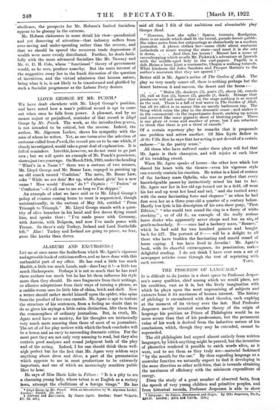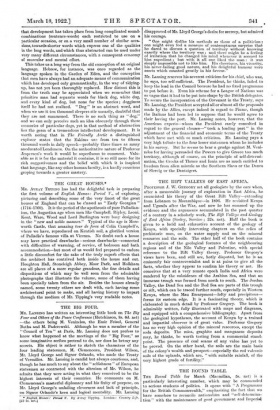THE PROGRESS OF LANGUAGE.* IT is difficult to do justice
in a short space to Professor Jesper- sen's many qualities, chief among which we would place, not his erudition, vast as it is, but the lively imagination with which he plays upon the most unpromising of subjects and • extracts from it its maximum of human interest. The history of philology is encumbered with dead theories, each expiring at the moment of its victory over the last. Had Profesor Jespersen merely invented another theory of the origin of language his position as Prince of Philologists would be no more secure than that of his predecessors, but the permanent value of his work is derived from the inductive nature of his conclusions, which, though they may be extended, cannot be superseded.
The old philologists had argued almost entirely from written languages, by "i'vhich anything might be proved, but the invention of phonetics rendered it possible to catch words alive, as it were, and to see them as they truly are—material fashioned "by the mouth for the ear." By thus regarding language as a muscular function we naturally expect to find it developing in the same direction as other activities, that is towards obtaining the maximum of efficiency with the minimum expenditure of energy. From the study of a great number of observed facts, frog the speech of very young children and primitive peoples, and from historical records, Professor Jespersen is able to show
• Language : its Nature, Development and origin. By Otto house; Ph.D., Litt.D. leaden: Allen and I.Thiyha. 1.18i5.1
that development has taken place from long complicated sound- combinations (sentence-words) each restricted to MO on a particular occasion, or on a very small number of similar occa- dons, towards shorter words which express one of the qualities In the long words, and which thus abstracted can be used under very many different circumstances, with a consequent ecoaomy of muscular and mental effort.
This takes us a long way from the old conception of an original language. Hebrew, for instance, was once regarded as the language spoken in the Garden of Eden, and the conception that men have always had an adequate means of communication which has developed only grammatically, in the way of tidying- up, has not yet been thoroughly replaced. How distant this is from the truth may be appreciated when we remember that primitive man had separate words for black dog, white dog, and every kind of dog, but none for the species ; dogginess itself he had not realized. " Dog " is an abstract word, and when we use it ten thousand sleepers stir uneasily, doubtful that they are not summoned. There is no such thing as "dog," and we can only perceive such an idea obscurely through these memories of particular dogs, yet in that method of abstraction lies the germ of a tremendous intellectual development. It is worth noting that in The Friendly Arctic a distinguished explorer states that the Eskimo use from ten to fifteen thousand words in daily speech—probably three times as many as educated Londoners. On the authoritative nature of Professor Jespersen's work it would be superfluous to comment. Valu- able as it is for the material it contains, it is so still more for its rich suggestiveness and the belief with which it is inspired that language, like any other human faculty, is a hardly conscious groping towards a greater mastery.



































 Previous page
Previous page